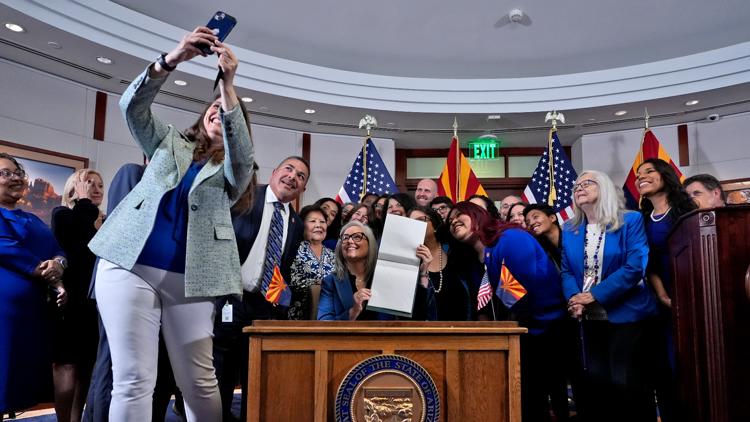The End of an Era: Arizona Repeals Civil War-Era Abortion Ban

Arizona has made history by officially repealing its Civil War-era ban on nearly all abortions. This significant decision comes as voters in the battleground state consider a ballot measure that would enshrine the right to an abortion in the state constitution.
The long and tumultuous journey to this repeal began when the Arizona Supreme Court, in a surprising move, allowed the state to enforce a law from 1864 that criminalized all abortions except in cases where a woman’s life was at risk. However, following swift action by state lawmakers, a bill was passed to repeal this archaic ban once and for all, with Democratic Governor Katie Hobbs signing the bill into law in May.
In a statement, Governor Hobbs emphasized the importance of protecting reproductive health care in Arizona, stating, “I trust women to make the decisions that are best for them, and know politicians do not belong in the doctor’s office.”
Since the U.S. Supreme Court overturned Roe v. Wade in 2022, abortion has been a contentious issue in Arizona’s political landscape. As the November general election approaches, the focus on reproductive rights remains paramount, with Arizona voters ultimately deciding the fate of abortion rights in the state.
The Road to Repeal
After the state Supreme Court’s decision, Governor Hobbs urged the state Legislature to act swiftly to undo the ban before it could take effect. Despite initial roadblocks by Republican lawmakers, bipartisan support eventually led to the successful passage of the repeal legislation, marking a significant victory for reproductive rights advocates.
The emotional debates and high-stakes negotiations within the Arizona legislature culminated in a historic moment when the ban was officially repealed, paving the way for a more progressive approach to reproductive healthcare in the state.
Current Law
With the near-total ban now lifted, Arizona law allows abortions up to 15 weeks gestation, with exceptions made to save the life of the mother. However, challenges remain as there are no allowances for cases of rape or incest after the 15-week mark.
Requirements for obtaining an abortion in Arizona include mandatory ultrasounds and waiting periods, with minors needing either parental consent or judicial authorization in most cases. These regulations underscore the complex and often contentious nature of abortion access in the state.
Voters Will Decide
The upcoming general election will give Arizona voters the opportunity to determine whether the right to abortion should be enshrined in the state constitution. Advocacy groups like Arizona for Abortion Access have been instrumental in securing the ballot measure, highlighting the importance of grassroots efforts in shaping reproductive healthcare policy.
If approved by voters, the measure would allow abortions until fetal viability, approximately 24 weeks, with provisions for cases where the mother’s health is at risk. This decision holds significant implications for the future of reproductive rights in Arizona.
Hobbs’ Full Statement
Governor Hobbs’ impassioned statement following the repeal of the abortion ban underscores the ongoing commitment to protecting reproductive freedoms in Arizona. Her unwavering dedication to women’s rights sets the stage for a new chapter in the state’s approach to healthcare access.
As Arizona embarks on this transformative journey towards greater reproductive rights, it is crucial for voters and policymakers to engage in thoughtful and constructive dialogue to ensure a more equitable and inclusive healthcare system for all.
Stay Informed with 12News+
For the latest news and updates on this groundbreaking development, tune in to 12News+ for comprehensive coverage and insightful analysis. Stay connected with the 12News app to receive real-time updates on all the latest developments in Arizona and beyond.
Join us on this historic journey towards a more equitable and inclusive healthcare system in Arizona. Together, we can shape a future where reproductive rights are respected, protected, and accessible to all.




